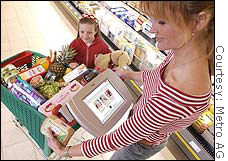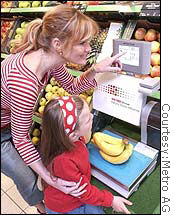NEW YORK (CNN/Money) -
Holiday shopping is notorious for crowded stores, endless waits at the checkout, and product shortages.
Now it looks like there could be a solution in the works.
Düsseldorf, Germany-based Metro AG, the world's fifth-largest retailing enterprise, debuted a prototype "store of the future" earlier this year.
The company, along with tech heavy hitters such as Intel (INTC: Research, Estimates), SAP (SAP: Research, Estimates), Hewlett-Packard (HPQ: Research, Estimates), and Cisco (CSCO: Research, Estimates), among others, is developing a whole slew of next generation retail tech gizmos that apparently enhance the do-it-yourself experience for shoppers.
 |
|
| The "personal shopping assistant." |
"We're simply presenting the technology of the future designed to cut costs for retailers and make shopping fun and exciting for consumers. But there will be a learning curve involved," said Homeyer Jurgen, spokesman for Metro AG.
Jurgen said the experimental store -- called Extra Future Store -- features innovative products like the "personal shopping assistant" -- or PSA -- an intelligent scale that automatically weighs and recognizes fresh produce, and 'smart shelves' that alert employees when to restock a product or when an item is in the wrong place.
Or how about electronic shelf labeling where the prices on the shelves are maintained centrally, self-checkout systems, and self-scanning information terminals in the meat and wine sections of supermarkets.
| 
| |

| 
| 
|

|
 Take a virtual tour of the Extra Future Store, the high-tech shopping experience that features computerized carts, smart shelves and more. Take a virtual tour of the Extra Future Store, the high-tech shopping experience that features computerized carts, smart shelves and more.
|
 Play video
Play video
(Real or Windows Media)
|
| 
|

|
|
"You could pick up a bottle of wine, scan it, and the terminal will tell you everything about it as well as the foods most suitable for that wine," Jurgen said. "If you can package meat, it will tell you which part of the cow the meat if is from, and suggestions about preparing it."
Metro AG for the first time will recreate the future store exhibit in the U.S. at the National Retail Federation's (NRF) annual convention in January in New York.
Others watch and wait ...
According to Dave Hogan, chief investment officer with the NRF, some major retailers are showing keen interest in the products. But he thinks it will be a decade before such high-tech retail innovations really catch on in the United States.
"The Home Depot (HD: Research, Estimates) this year implemented their self-checkout terminals and they're not very intuitive," said Hogan. "The system doesn't coach customers how to use it. But Home Depot is working on it."
"Some of this new technology will work, some won't," Hogan said. "The bottom line is that not everyone will like using the PSA or the self-checkout, but at least they will have the choice to use it."
 |
|
| The intelligent scale. |
The Stop & Shop chain, owned by Netherlands-based food retailer Royal Ahold (AHO: Research, Estimates), has been testing the PSA at three of its stores in Massachusetts.
The PSA is a touchscreen PC tablet attached to the handle of a shopping cart and it comes with a barcode scanner. Shoppers can scan an item and get information including the price, description, and special offers. At the checkout, you simply transfer the total amount directly from the tablet to the checkout terminal.
"It actually saves shoppers some time in the long run," said Rick Stockwood, spokesman for Stop & Shop. "Our customers even bag the groceries as they go along. So far the feedback's been positive. We think the PSA is one of the best ways for us to have a one-on-one conversation with our customer."
Discounters Wal-Mart (WMT: Research, Estimates) and Target (TGT: Research, Estimates) said they have been closely tracking Metro AG's latest retail gadgets.
"We're always interested in new technology," said Bill Hertz, spokesman for Wal-Mart, the world's largest retailer, which ended its own trial with "smart shelves" in July. "We weren't completely satisfied with it," Hertz said.
Target spokeswoman Paula Thornton-Greear said the discounter "often researches and tests technologies" but declined to comment on any specific retail technologies it may be looking into at this time.
... and some remain skeptical
Not everyone is sold yet on the idea of a do-it-yourself customer.
"There's a reason why people go to stores. It's for good old-fashioned customer service that involves human interaction. We seem to be getting away from that somehow," said Harry Friedman, retail consultant and CEO of the Friedman Group.
"It's true that retailing is going through a shakeout period and more companies are trying to attract the customer through technology by making it fun to shop," Friedman added. "But if you're going to replace people with machine at stores, why shouldn't people just shop on the Internet then?"

|

